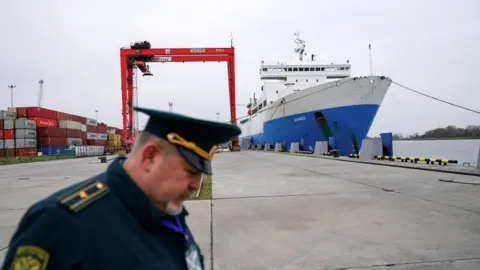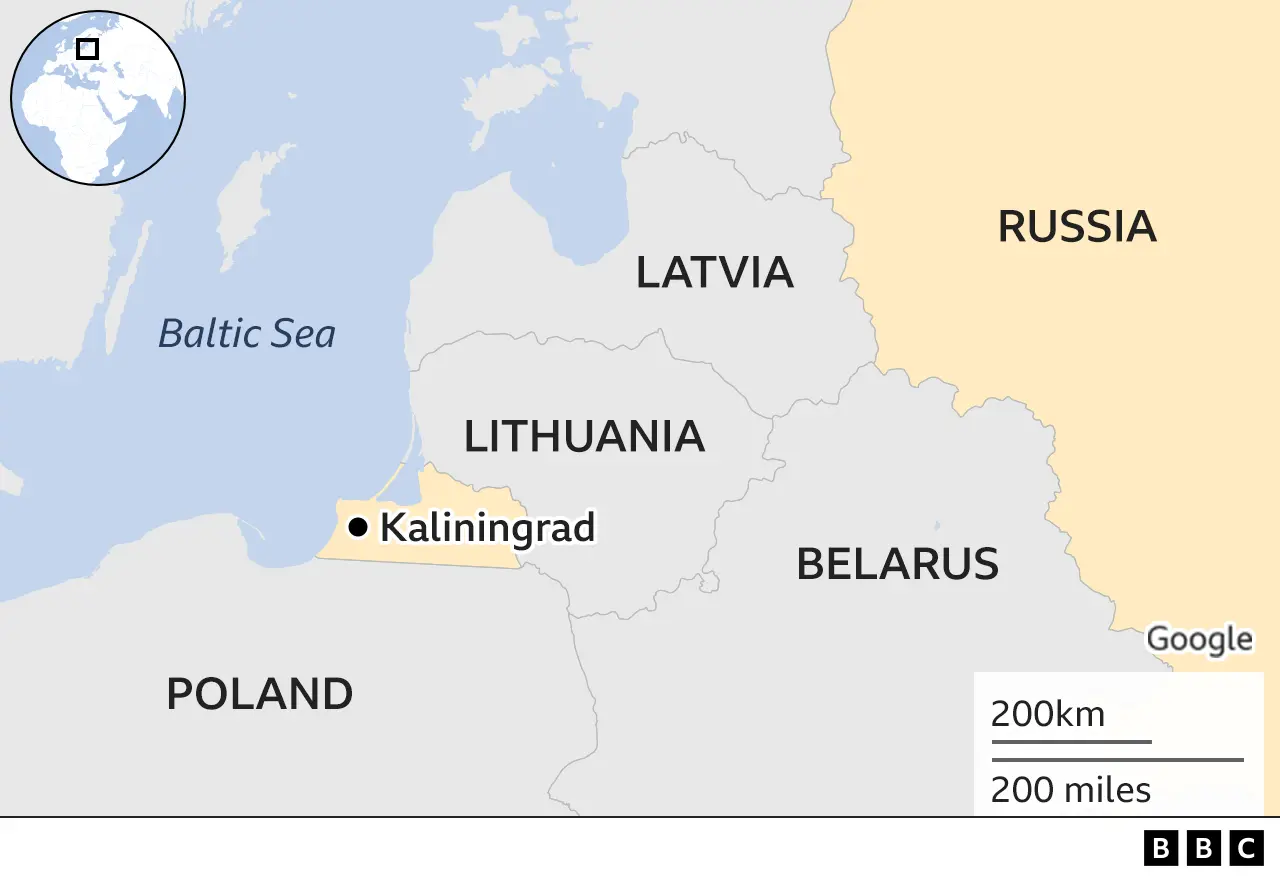Kaliningrad: Russia warns Lithuania of consequences over rail transit sanctions
 Reuters
ReutersRussia has warned Lithuania of "serious" consequences after it banned the rail transfer of some goods to the Russian territory of Kaliningrad.
Russia "will certainly respond to such hostile actions," senior security official Nikolai Patrushev said.
Lithuania says it is only following the EU sanctions imposed over Moscow's invasion of Ukraine.
Kaliningrad - a strategic region where Russia's Baltic Fleet is headquartered - has no border with mainland Russia.
The western territory was annexed from Germany after World War Two in 1945 and is bordered by EU and Nato members Lithuania and Poland.
The region - where an estimated one million people live - relies heavily on imports of raw materials and spare parts from Russia and the EU.
Regional governor Anton Alikhanov said the ban would cover around 50% of the items that Kaliningrad imports.

During a visit on Tuesday to Kaliningrad, Mr Patrushev said the blockade by Lithuania was instigated by the West "in violation of... international law".
The secretary of Russia's Security Council warned that "appropriate measures" would be taken "in the near future".
"Their consequences will have a serious negative impact on the population of Lithuania," he added, without giving any further details.
Earlier on Tuesday, the EU ambassador was summoned to the Russian foreign ministry over the blockade.
Last week, the Lithuanian authorities announced they would ban goods subject to EU sanctions from passing through their territory to Kaliningrad.
Lithuanian Foreign Minister Gabrielius Landsbergis said: "It's not Lithuania doing anything: it's European sanctions that started working from 17 June... It was done with consultation from the European Commission and under European Commission guidelines."
The EU has echoed Lithuania's statement, saying that the country is just implementing sanctions imposed by the EU as a result of Russia's invasion of Ukraine.
The sanctions list includes coal, metals, construction materials and advanced technology.
As a member of the Nato military alliance, Lithuania is protected by collective defence treaties.
US state department spokesman Ned Price said the US was standing by Lithuania, adding that the country's commitment to Nato's Article 5 - which views an attack on one member state as an attack on all - was "iron clad".


Russian officials are furious with Lithuania - and the EU - over the ban on the transit of some goods to Kaliningrad. They're likening it to a blockade.
But when the foreign ministry in Moscow says "Russia reserves the right to take actions to protect its national interests", what exactly does it mean? What actions and when?
The Kremlin says it's trying to work that out right now.
On Monday, President Vladimir Putin's spokesman, Dmitry Peskov, noted that "the situation is really very serious and requires a very deep analysis before preparing any measures or any decisions. This thorough analysis will be carried out over the next few days."
Today, one of Mr Putin's closest allies, Nikolai Patrushev, flew to the Kaliningrad region to discuss "national security in north-west Russia". Mr Patrushev is secretary of Russia's powerful Security Council. Officials claim the visit was planned long in advance. What a coincidence.
When it comes to "national security", Kaliningrad is a key location. Russia's Baltic fleet has its headquarters there. And Moscow has previously deployed nuclear-capable Iskander ballistic missiles to Kaliningrad region.

In other developments on Tuesday:
- The eastern city of Severodonetskhas been subjected to heavy shelling by Russian forces, the regional governor says. In a similar way to the Azovstal steel plant in Mariupol, Ukrainian troops in the city now hold on to just one factory where hundreds of civilians are also sheltering
- Russia says it has repelled an attempt by Ukraine's forces to retake Snake Island in the Black Sea, which was captured by Moscow at the start of the invasion
- German Chancellor Olaf Scholz said Germany would continue to send weapons to Ukraine "for as long as Ukraine needs our support". Foreign Secretary Liz Truss said the UK was also "determined to provide more weapons" and "impose more sanctions"
